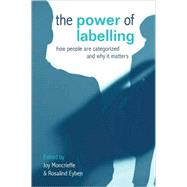- ISBN: 9781844073948 | 1844073947
- Cover: Paperback
- Copyright: 6/30/2007
'˘ Comprehensive examination of how labels such as 'The Poor,' or 'Asylum Seeker' are created and applied and how these labels shape power relations in development and aid work '˘ Authored by leading development practitioners and researchers from the Institute of Development Studies and including international case studies addressing gender, race, religion, poverty and power in various contexts '˘ Hands-on recommendations for tackling stigmatizing labels and methods for creating new, empowering labels and constructive ways to frame development problems What does it mean to be part of the mass known as 'The Poor'? What visions are conjured up in our minds when someone is labeled Muslim? And what assumptions do we make about their needs, desirability, security and disposability? How do we react individually and as a society? Who develops these labels, what power do the labels carry and how do such labels affect how people are treated? This timely book tackles the critical and controversial issue of how people are labeled and categorized and how their problems are framed and dealt with. Drawing on vast international experience and current theory, the authors examine how labels are constituted and applied by governments and aid agencies. It also examines how power relations are amplified or set on collision courses by labeling, and how the labeled view themselves and often act contrary to their externally applied labels or, in some cases, accept the labels. Coverage includes analysis of labels in current development and aid practice in a number of contexts. Importantly, the authors provide suggestions for how policy makers and professionals can tackle negative forms of labeling, including how counter-labeling might influence key concerns such as poverty reduction, human rights, race relations, and security.






